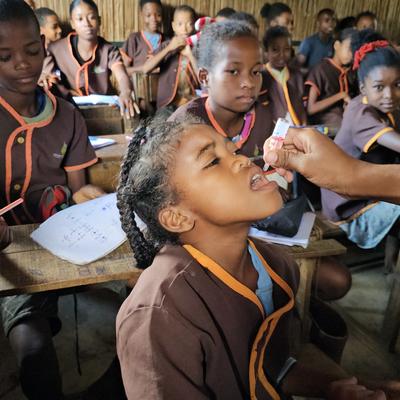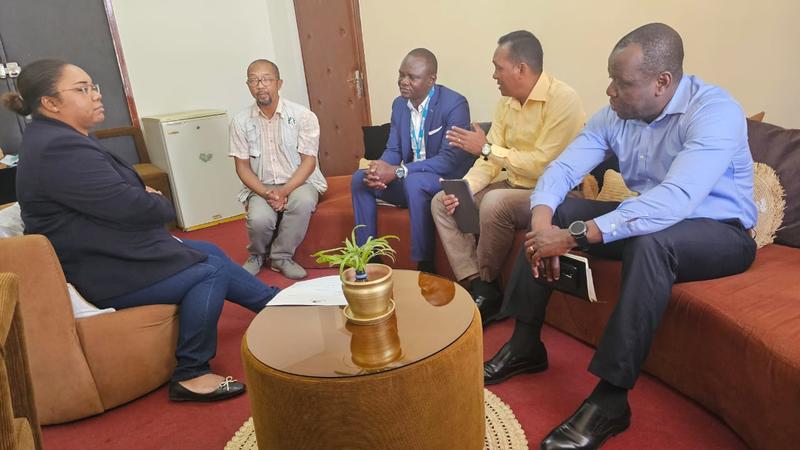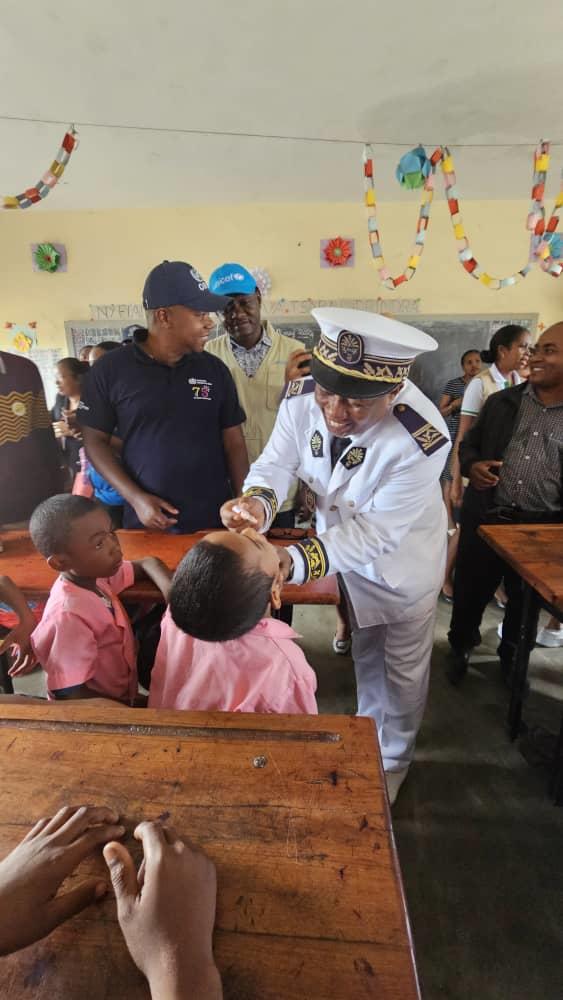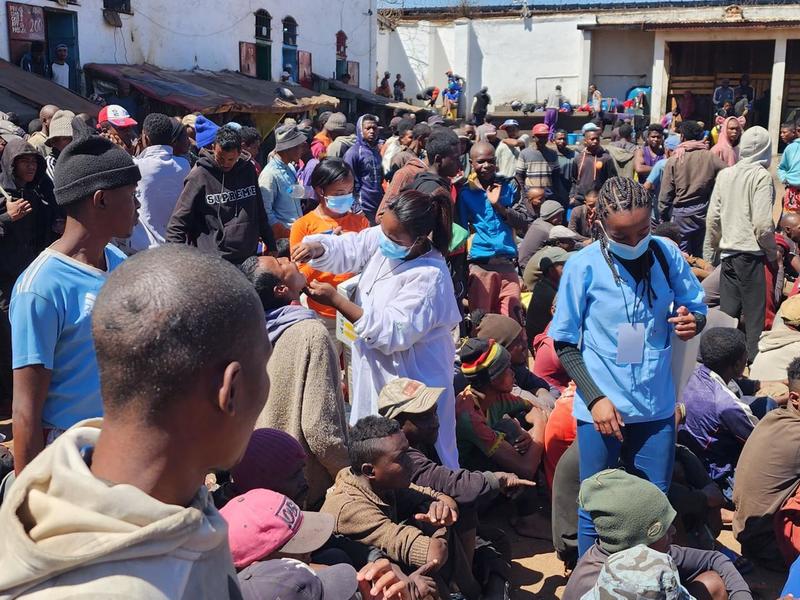
Madagascar’s innovative polio vaccination campaigns, supported by the Ministry of National Education, integrated schools as key hubs for reaching children aged 5-14. By targeting over 7 million school-aged children, the approach utilized tailored social and behavior change (SBC) strategies to vaccinate 28% of the total vaccinated children in educational settings. School directors, teachers, and parent associations were engaged to promote vaccinations, while symbolic vaccination events in classrooms built public trust. This model highlights the crucial role schools play in driving health outcomes and advancing polio eradication efforts.
Photo: Vaccination session in a school. UNICEF/2024/Rimoyal Ratnan
Madagascar's Commitment to Polio Vaccination
In Madagascar, the Ministry of Public Health (MPH), through its Expanded Program on Immunization (EPI) Directorate and the Polio Emergency Operations Center (COUP), has demonstrated its commitment to public health by conducting seven rounds of Supplementary Immunization Activities (SIA) against type 1 variant poliovirus since May 2023. With support from partners of the Global Polio Eradication Initiative (GPEI), these campaigns aimed to safeguard vulnerable populations through comprehensive vaccination efforts. The latest round, held in October 2024, incorporated measles vaccination and catch-up for zero-dose and under-vaccinated children, alongside routine immunization efforts. The diverse target groups—ranging from children aged 0-59 months and 0-15 years to adults in specific regions—required tailored social and behavior change (SBC) strategies to ensure maximum impact.
Tackling a Major Challenge
Each round faced the daunting task of vaccinating over 12 million children aged 0-14 years, including 7 million aged 5-14 years. Independent monitoring revealed that the most common reason for missed vaccinations was the absence of children during vaccination visits. To address this, stronger advocacy was needed to engage the Ministry of National Education (MEN) and facilitate school-based vaccinations, where children spend much of their day. This approach also required parental consent to ensure widespread acceptance.
Initial Collaboration and Lessons Learned
The first collaboration between the MPH and MEN was trialed during the fourth round of SIAs in October 2023. While the initiative marked a significant step forward, several challenges emerged:
- Delayed Communication: Information about the campaign reached regions, districts, and basic health centers too late.
- Limited Engagement: School administrators had minimal involvement in communication, advocacy, and campaign implementation.
- Mapping Difficulties: School mapping tools were underutilized, resulting in inaccurate estimates of children to be vaccinated.
- Parental Consent: There was insufficient dialogue with parents to secure consent for vaccinations in schools.
- Stakeholder Participation: Collaboration with entities like the National Directorate of Catholic Schools (DINEC) was limited, and engagement of local leaders was inconsistent.
Despite these challenges, the experience provided valuable lessons to refine the approach for future campaigns.
Strengthening the Approach with UNICEF’s Support
In December 2023, a UNICEF Headquarters SBC support mission to Madagascar focused on enhancing the school-based vaccination strategy. Building on the lessons from October 2023, the "Social Mobilization and Communication" commission co-created a revised SBC approach. This plan, integrated into campaign budgets, was designed as an innovative strategy to address previous gaps. Implementation began once the MPH confirmed the 2024 campaign dates.

Photo: Advocacy session at the Ministry of National Education (Director of Mandatory Education) with COUP and GPEI members. UNICEF/2024/Rimoyal Ratnan
Strategic Activities
The refined SBC approach debuted during the first round of 2024 in May. The campaign included:
- Official notices from the MPH to MEN to inform education authorities about the vaccination campaign.
- Instructions to regional, district, and local education directors to collaborate with MPH for school-based vaccinations.
- Advocacy sessions with MEN representatives led by COUP, supported by GPEI partners.
- Collaboration with DINEC's health division to facilitate vaccinations in Catholic schools.
- Deployment of key messages, visual materials, and audiovisual spots to engage parents.
- Symbolic launch events featuring school-based vaccinations to reinforce public trust.
- Detailed school mapping to estimate eligible children for vaccination.
- Mobilization of youth and women’s associations to encourage parental participation.

Photo: Symbolic vaccination of children during the campaign launch by the Prefect of Tamatave. UNICEF/2024/Rimoyal Ratnan
Promising Results
The independent monitoring results from the first SIA round in 2024 demonstrated significant progress:
- Awareness: 97% of parents were informed about the campaign, primarily through door-to-door visits by social mobilizers (65%).
- School-Based Vaccination: Of 7,835,742 children aged 5-14 vaccinated, 28% (2,216,997) received vaccines in schools.
- Although refusals were reported, particularly in private schools including Catholic institutions, these challenges were mitigated through local refusal management committees and supplementary outreach activities. Weekend visits to households and places of worship further minimized refusal rates. Since the response began in May 2023, no new cVDPV1 cases have been detected.

Lessons Learned and Future Recommendations
Key takeaways to enhance this approach include:
- Engaging DINEC at least a month before campaigns to ensure comprehensive preparation.
- Involving school directors and parent association leaders early through dialogue with local health and education representatives.
- Sharing campaign results with MEN to highlight the value of their contributions.
- Encouraging participation from political, administrative, religious, and traditional leaders to strengthen implementation.
This SBC approach holds promise not only for polio vaccination campaigns targeting children in schools but also for introducing the HPV vaccine into Madagascar's routine immunization program. With context-specific adaptations, it can be replicated in other countries to achieve similar success.
Written by Rimoyal Ratnan, International SBC Polio/PEV Consultant, UNICEF Madagascar

